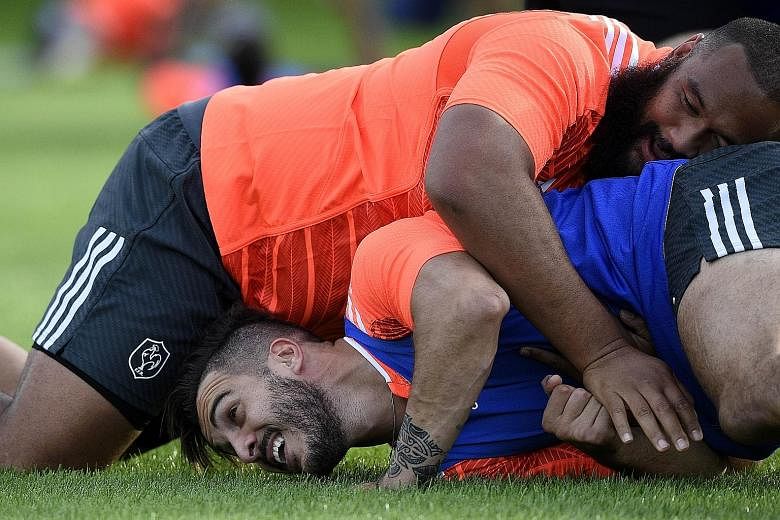They are the monster men of sport.
They consume obscene amounts of food. And they work that mass into a fast-moving brutality that literally makes the ground shudder if you are within shouting distance of them.
They are the rugby players, 600 of whom, from 20 nations, will compete for their own World Cup on English soil over the coming 40 days and nights.
Let's be clear. Rugby is not the corrupted mess that Fifa, from the top down, is now proved to be. But on its transition from true-blue amateur to professionalism over the past two decades, its growth has been gargantuan and not entirely wholesome.
When the tournament began at Twickenham stadium last night, much was made of Nemani Nadolo, a 1.83m, 127kg Fijian who is said to dwarf Jonah Lomu, the juggernaut New Zealander of 20 years ago.
Lomu is these days dependent on a dialysis machine after his kidney transplant failed him four years ago. But he's touring the country speaking about the wholesomeness of the game as a rugby ambassador for the brewers Heineken.
Those of us who saw Lomu in his prime, handing off English opponents as if they were just flotsam in his wake and hitting speeds that were timed at 10.98sec over 100m, were awed by this giant specimen.
"My way of thinking when I was running with the ball," he now tells audiences, "was that I use every option available to me, but if you leave me no option, I run over you."
Such a gentle giant, I met him in New Zealand and observed him as he was enthralled by the delicate skills of a wood turner.
Lomu and his Fijian lookalike (in terms of fast-moving body mass) are no longer the heaviest men, although very obviously far from the lightweights.
Those "honours" respectively go to France's Uini Atonio, who weighs in at 141kg, and Samoa's Vavao Afemai who is literally half the man, a mere 65 kg.
They aren't scheduled to meet, unless both come through their pools of five nations each in the group phases.
And, in any case, Atonio makes his presence felt in the heaving, hulking scrums, and you would never catch the relative flyweight Samoan anywhere near those.
But rugby union, which splits essentially into Northern and Southern Hemisphere power struggles, has come a long way since the illusion of it being a rather snooty, public school affair.
If you have bothered to follow the sport at all, you must have heard the old saying: "Soccer is a gentleman's game played by hooligans. On the other hand, rugby is a hooligans' game played by gentlemen."
Well, I have met doctors and lawyers at the top of rugby, and then shuddered at their collusive force on the pitch. And you may have read, possibly too many times, about the antics that footballers get up to in the bars and bedrooms where they should not be.
The truth be told, those are dated and hackneyed presumptions. A French newspaper, attempting to put down England's World Cup of rugby, still said this week that the oval ball game is in the hands of upper-school privileged people.
Well, I doubt you could call Nadalo privileged, any more than you would do Lomu. They came through the school of hard knocks, and both fought their way into New Zealand where the rugby is not simply the toughest contact sport on earth, but from where (with some help from the Pacific islanders) the All Blacks dominate the world out of a total population of 4.4 million.
For myself, having chosen to play football but coming through a rugby-playing school, I confess I lacked appetite for the physicality of the rugged sport.
That feeling was intensified when, 25 or more years ago in South Africa's Highveld, I spent some time on the bench during a Springboks v British Lions contest observing the collision of 110kg-plus men thundering towards me.
That was when the ground moved. It was also when I questioned, to put it politely, the steroidal distortion of the sport.
Proof? I had none. It just looked that way.
Today, they tell us it is monster feeding that produces monstrous guys making ferocious hits on the field. One England player, flanker Tom Wood, went through his diet sheet the other day. He said he needed 6,000 calories each day to maintain his power.
Wood isn't by any stretch the biggest man out there, but his calorie intake (about three times the average healthy diet) means, as he admits, eating until you feel sick, and then eating some more.
Breakfast is chicken breast, spinach, green beans, carrots, porridge, eggs and toast. Lunch might be curry or carbonara, soya beans, sweet potatoes, lentils, apples, oranges, whole-meat pasta, brown rice, whole-wheat bread, fresh vegetables. Afternoon snack includes tuna wraps. Evening meal menus offer cottage pie, steak, chicken, steamed vegetables and beetroot juice.
Protein shakes and energy bars are handed out after training, morning and afternoon.
All this is overseen by dietitians, which might explain why there is no mention of the beer associated with rugby. What goes into the body has to be worked to turn fat into muscle. All the dietary stuff spoken about is legal.
Anabolic steroids are not. When I said I had no proof of banned substances, that was then. The UK Anti-Doping commission has reported that of 47 British athletes currently banned for doping, 16 are from rugby union and 12 from rugby league.
Most blame food supplements they did not know contained illegal ingredients. However, a South Africa study of 11,000 students at rugby-playing high schools in KwaZulu-Natal concluded that 9.5 per cent of 18-year-olds took steroids, either for rugby or for bodybuilding prowess.
Those are the boys who admit to it, under condition of anonymity.
Enjoy the big men - if you tune in.


